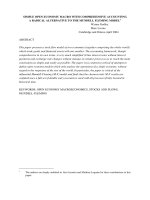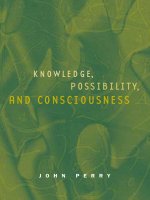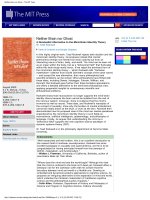the mit press neither brain nor ghost a nondualist alternative to the mind-brain identity theory aug 2005
Bạn đang xem bản rút gọn của tài liệu. Xem và tải ngay bản đầy đủ của tài liệu tại đây (284.41 KB, 2 trang )
Neither Brain nor Ghost - The MIT Press
August 2005
6 x 9, 253 pp., 6 illus.
$36.00/£23.95 (CLOTH)
ISBN-10:
0-262-18247-5
ISBN-13:
978-0-262-18247-8
Other Editions
Paper (2007)
Series
Bradford Books
Related Links
Find this book in a library
Neither Brain nor Ghost
A Nondualist Alternative to the Mind-Brain Identity Theory
W. Teed Rockwell
Table of Contents and Sample Chapters
In this highly original work, Teed Rockwell rejects both dualism and the
mind-brain identity theory. He proposes instead that mental
phenomena emerge not merely from brain activity but from an
interacting nexus of brain, body, and world. The mind can be seen not
as an organ within the body, but as a "behavioral field" that fluctuates
within this brain-body-world nexus. If we reject the dominant form of
the mind-brain identity theory which Rockwell calls "Cartesian
materialism" (distinct from Daniel Dennett's concept of the same name)
and accept this new alternative, then many philosophical and
scientific problems can be solved. Other philosophers have flirted with
these ideas, including Dewey, Heidegger, Putnam, Millikan, and
Dennett. But Rockwell goes further than these tentative speculations
and offers a detailed alternative to the dominant philosophical view,
applying pragmatist insights to contemporary scientific and
philosophical problems.
Rockwell shows that neuroscience no longer supports the mind-brain
identity theory because the brain cannot be isolated from the rest of
the nervous system; moreover, there is evidence that the mind is
hormonal as well as neural. These data, and Rockwell's reanalysis of
the concept of causality, show why the borders of mental embodiment
cannot be neatly drawn at the skull, or even at the skin. Rockwell then
demonstrates how his proposed view of the mind can resolve paradoxes
engendered by the mind-brain identity theory in such fields as
neuroscience, artificial intelligence, epistemology, and philosophy of
language. Finally, he argues that understanding the mind as a
"behavioral field" supports the new cognitive science paradigm of
dynamic systems theory (DST).
W. Teed Rockwell is in the philosophy department at Sonoma State
University.
Endorsements
"Well researched and well written, this is an excellent introduction to
the nascent field of nonlinear neurodynamics. Rockwell has some
excellent passages on causality and supervenience, and he is to be
congratulated for having extricated himself from the swamps of
GOFAI, materialism, and functionalism."
Walter J. Freeman, University of California, Berkeley, author of
How Brains Make Up Their Minds
"Where does the mind end and the world begin? Although the view
that the mind is confined to the brain isn't dead yet, Rockwell offers a
Deweyan nail for the Cartesian coffin with his answer that the
boundary between mind and world is a flexible one. Drawing on
embodied and dynamical systems approaches to cognitive science, he
proposes an intriguing alternative to the separation of mind and world,
which underlies the Cartesian materialism of traditional cognitive
science and the philosophical puzzles it spawns."
Colin Allen, Professor, Department of History and Philosophy of
Science and Program in Cognitive Science, Indiana University
Join an E-mail Alert List
E-Mail This Link
(1 of 2) [15.08.2007 12:48:21]
Neither Brain nor Ghost - The MIT Press
"A new view of mind is in the air. Teed Rockwell has sensed it and
articulated it beautifully in this book. Using a powerful combination of
Dewey's pragmatism and dynamical systems theory, he proposes a
bold alternative to Cartesian materialism that deserves careful
scrutiny."
J. A. Scott Kelso, Glenwood and Martha Creech Chair in Science
and Director, Center for Complex Systems and Brain Sciences, Florida
Atlantic University
Of Related Interest:
Communicative Action and
Rational Choice
Joseph Heath
Paper / March 2003
Perspectives on Science:
Historical, Philosophical, Social
Quarterly (Spring, Summer, Fall,
Winter)
See Other Titles In:
> Cognition, Brain, & Behavior
- General
- Philosophy of Mind
> Humanities
- Philosophy
> Neuroscience
- Neurophysiology & Neuroanatomy
> Philosophy
- General
- Philosophy of Mind
TECHNOLOGY PARTNER: Azility, Inc. TERMS OF USE | PRIVACY POLICY | COPYRIGHT © 2007
(2 of 2) [15.08.2007 12:48:21]









